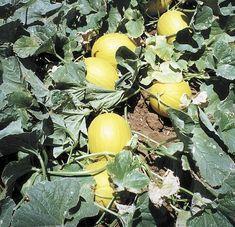
US scientists have discovered a new way to make Cantaloupe and Honeydew melons more nutritious.
The Agricultural Research Service, the in-house research division for the US Department of Agriculture, found that by spraying melons with potassium whilst still on the vine, nutritional levels were enhanced.
The spray, of either potassium chloride or glycine-potassium, meant the level of beta-carotene in the harvested fruit was greatly increased.
A vitamin A precursor, beta-carotene is a powerful anti-oxidant and is implicated in the prevention of a range of health conditions, including cancer.
The potassium compounds were used once a week throughout the four to six week growing period.
The treatment process also boosts photosynthesis, which increases sugar levels and leads to higher levels of vitamin C.
It is hoped that by making melons up to 11 percent sweeter, they could be classified as a gourmet-type fruit, attracting the attention of high-end restaurants and buyers.
An ARS spokesman said the readily available potassium formulations are safe and inexpensive, and could potentially be combined with insecticides and sprays for controlling diseases.
Other research indicated that by applying calcium with the potassium compounds, melons could have increased shelf life and be more resistant to disease.



